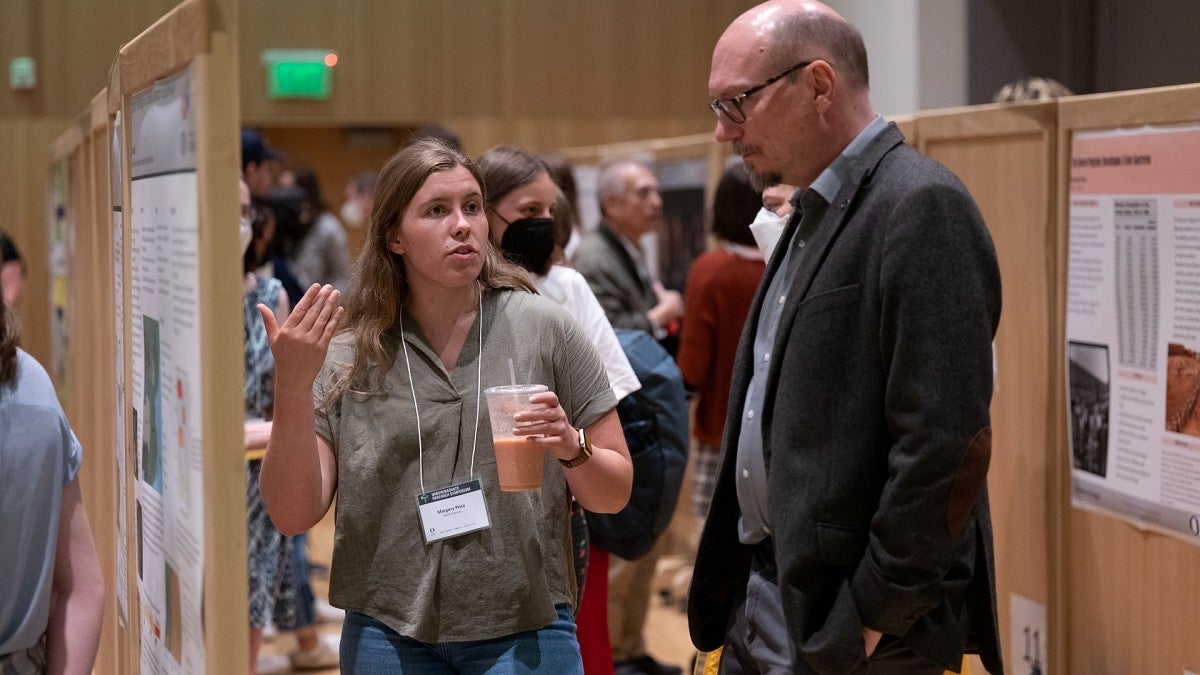Almost 500 undergraduate students or recent graduates will present research projects at the University of Oregon’s Undergraduate Research Symposium on May 23.
The annual event empowers undergraduates to share their ideas, discoveries and artistic work with the campus and the local community. Students can choose to present their research and findings through poster presentations, oral presentations, creative works performances, or even films and documentaries, allowing research and work from any discipline to be showcased.
Rilynn Zarate, a UO junior majoring in architecture, has been studying how to create and control curvatures in wood, for potential applications in design and architecture. Her interest in the subject grew out of a challenge a professor gave her class: to tie a piece of wood into a knot. Zarate has since spent sometimes-grueling hours measuring wet wood, often assisted in her research by her 7-year-old twins, who she calls “my biggest cheerleaders.”
Zarate said she’s a little nervous to present at the symposium, due to feelings of imposter syndrome that discount her work as “not real science” or potentially letting down “all the folks who have helped me along the way somehow.”
But, she said, “I am a big believer in embracing the nerves and the experience no matter the outcome. I am excited to see how it turns out.”
“Getting to bring my twins into the scientific process and show them that women belong here has been the most fruitful part of the whole experience,” Zarate added.
Now in its 14th year, the symposium has grown from an event that largely drew science researchers to a bigger, more diverse and multidisciplinary showcase. This year, a total of 73 majors across all the UO’s schools and colleges will be represented. The 490 student presenters have worked with 377 research mentors from the UO, including 92 graduate students.
The all-day event is free and open to both the campus community and the general public. It will primarily be held in rooms across the Erb Memorial Union. The full schedule is available on the symposium website and the event program.
Kevin Hatfield, assistant vice provost for undergraduate research and distinguished scholarships, said he sees the symposium as an open house of sorts, an opportunity for students to not only present to faculty members and their peers but also the wider Eugene and Lane County communities.
“It’s one of those wonderful moments for the community to connect and interact with the university,” he said. “It’s mutually beneficial. The community gets to learn and talk with budding researchers, and for students it’s a great opportunity to grow and present to a new audience.”
President Karl Scholz will be delivering remarks at the symposium’s reception and the event will feature a keynote luncheon address from UO alum and three-time symposium presenter Adie Fecker, now a medical student at Oregon Health and Science University.
The symposium also brings contingents of students from Lane Community College and Umpqua Community College, most of whom will also be presenting their research.
Around 300 high school students and their teachers will also attend to learn and explore the campus, through the UO’s Student Academy to Inspire Learning program.
Chandlor Henderson, a UO junior studying journalism, will present a deeply personal project at the event, entitled “400-Year Nightmare.” A UO McNair Scholar, Henderson has spent three years researching and recreating his personal family tree through qualitative interviews and archival research, with the goal of identifying strategies used by Black families during the Reconstruction era and afterward to survive.
“I think my biggest discovery was that my family history was so well-documented,” he said. “In America, we are often told that Black Americans’ history was completely erased, but that's not quite true... The hard part is reconciling the information you are finding, and not allowing it to cause too much emotional distress. I feel so much pride in the resilience of my ancestors, I have little room left for animosity toward others.”
Henderson, who is completing a minor in comic and cartoon studies, hopes to expand on the project after the symposium and turn it into a graphic novel this summer, in part because he is tired of hearing false narratives about how little Black Americans have contributed to America.
“I want to create a story for my kids to read, and kids coming from similar backgrounds, so they aren't tricked into believing untrue stories told by bad actors,” Henderson said.


